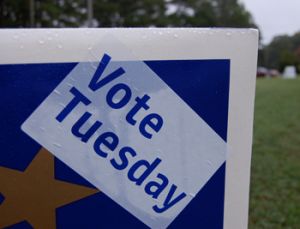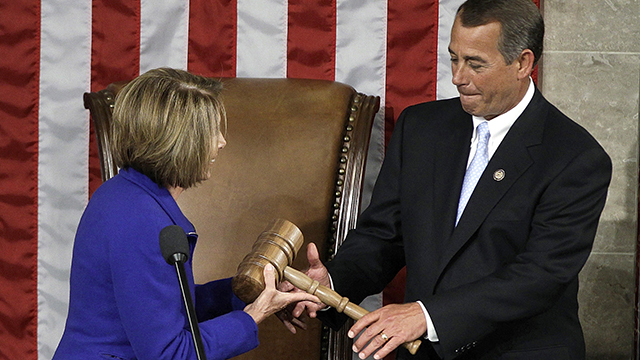This post originally appeared at The American Prospect.

Mike Challenger, of Bothell, Wash., applauds a speaker as he stands dressed in Revolutionary-period wear at a tax day tea party rally of about a hundred protesters Friday, April 15, 2011, in Bellevue, Wash. (AP Photo/Elaine Thompson)
In the 25th anniversary issue of The American Prospect, Jacob Hacker and Paul Pierson offered an explanation of what they call the “no-cost extremism” of current Republican politics. How does the GOP continue to move rightward and still win, they ask, despite the American public’s opposition to much of the party’s agenda? “Poll after poll,” they point out, “shows that major GOP positions are not all that popular. Among swing voters, there has been nothing like the party’s right turn. … On many social issues, such as gay marriage, middle-of-the-road voters have actually moved left. Yet the Republican Party keeps heading right. … In a 50-50 nation, Republicans have learned how to have their extremist cake and eat it too.”
In their otherwise compelling essay, however, Hacker and Pierson only briefly allude to two mutually reinforcing sets of structural advantages that result in Republican over-representation. One set of advantages arises from the electoral system, the other from the socioeconomic differences between the two parties’ supporters. Taken together, these built-in advantages in the Republicans’ favor systematically tilt the electoral playing field. They make every Democratic victory an uphill climb.
The GOP’s Electoral-System Edge
A series of characteristics of the American electoral system, including the structure and procedures of the Senate and House as well as the electoral calendar, are now working for the Republicans.
Meanwhile, on the other side of Capitol Hill, Republicans have also been able to outperform their share of the vote. In 2012, House Speaker John Boehner maintained his majorities even though Republican House candidates received a million-plus fewer votes nationwide than Democratic House candidates captured. As Hacker and Pierson correctly note, despite losing the national popular vote in that year’s presidential race, Mitt Romney carried more House districts than Barack Obama did. This gap between national totals and district outcomes reflects two developments, one demographic and the other political. Democratic voters are now “inefficiently” distributed because they have become increasingly concentrated in cities, and the GOP has been able to capitalize on population patterns through the strategic use of partisan gerrymandering.
Procedural rules in the Senate and House also favor Republicans. In neither chamber is a mere majority required to pass legislation — in the Senate, because of the filibuster, and in the House, because of the Republican leadership’s so-called “Hastert Rule” (named after the former Republican Speaker Dennis Hastert, though he was neither the rule’s inventor nor the first speaker to employ it). Under the Hastert rule, legislation is not allowed to go to a vote without the support of a majority of the majority party — a rule that effectively provides a veto to an electoral minority.
The bottom line is that the constitutional design of the Senate, population geography and the use of strategic gerrymandering in the creation of House districts, and procedural rules for both chambers all combine to exaggerate contemporary Republican influence on Capitol Hill. Leaving aside all the usual factors influencing elections — state of the economy, issues, public opinion, candidate quality and campaign finance — the GOP begins every congressional election cycle with a built-in head start, and every session of Congress at representational levels that exaggerate the party’s underlying popular support.
The timing of American elections also magnifies Republican clout. The majority of state and local elections are conducted during low-turnout, non-presidential cycles. Of the 48 American governors elected for four years — New Hampshire’s and Vermont’s governors serve two-year terms — only nine are chosen at the same time as the president. The remaining 39 are chosen in midterm elections or in odd-numbered years. The vast majority of American state legislators are also elected in non-presidential elections. Although they did not create the electoral calendar, Republicans benefit from it because of the party’s second set of structural advantages. When turnout is low, more-affluent Americans typically represent a higher proportion.
The Socioeconomic Amplifier
 Generational, gendered, racial and class-based disparities in wealth and political power manifestly favor the Republicans’ older, more male, whiter and wealthier coalition. In a country where registration is voluntary and voting takes place on a workday, the party with older and more-affluent voters enjoys a boost at the polls. It’s no coincidence that Republicans tend to oppose early or same-day registration but support stricter voter-ID laws to solve the phantom problem of voter fraud. A few months following the 2014 midterms, with despair palpable in his voice, President Obama lamented that the “political map” would “completely change” if every American voted.
Generational, gendered, racial and class-based disparities in wealth and political power manifestly favor the Republicans’ older, more male, whiter and wealthier coalition. In a country where registration is voluntary and voting takes place on a workday, the party with older and more-affluent voters enjoys a boost at the polls. It’s no coincidence that Republicans tend to oppose early or same-day registration but support stricter voter-ID laws to solve the phantom problem of voter fraud. A few months following the 2014 midterms, with despair palpable in his voice, President Obama lamented that the “political map” would “completely change” if every American voted.
Hacker and Pierson ascribe some of the puzzling electoral success of GOP extremism to the greater intensity demonstrated by the Republican Party’s base. To be sure, more-intense voters may donate their time and money, yet the votes of intense and less-than-intense voters count the same: once.
What more likely explains the disconnect between measured public attitudes and political outcomes is a difference in survey methods. Polls of election preferences invariably sample registered or likely voters, whereas many public-policy polls survey the general population. Thus a survey indicating that a slight majority of American adults supports a particular policy may well hide the fact that only a plurality of American voters support that same policy — or even that a voter majority opposes it. What’s popular in the polls is not identical to what’s popular at the polls.
So it comes to pass that, in our supposed 50-50 nation, the voice and vote of one half of the country count more than the voice and vote of the other half. Why would we expect any such political system to produce policy victories — or electoral rewards — in equal measure?
Winning with Nothing
The Republicans have another advantage that stems from the party’s ideological orientation toward government. They are not just the “party of no,” opposing liberal initiatives. They are also the party of nothing — the party that is content to have government do nothing.
“Nothing” is the result American politics is best geared to deliver. Nothing is easy to achieve because of checks and balances in the American system and the generally awesome staying power of the status quo. If a series of attempts to change law or policy fail and nothing is done, the status quo “wins.” Without knowing anything about the details of various policy proposals, the degree of popular support and opposition for each of them, or which party and officials control which levers of government, you can generally place a safe bet on nothing happening.
Look at the Republican response to the passage of Obamacare. Those who mocked the GOP’s repeated votes to repeal the Affordable Care Act miss the point of the kabuki dance Republican legislators performed. Despite talk of “repeal and replace,” most Republicans never intended to provide a substantive policy alternative. Those dozens of congressional “repeal and replace” votes might best be described as “repeal and maybe figure it out later” votes.
But so what? If the primary goal of casting those votes was to remind voters that the GOP wants to undo things, and undoing things can generate sufficient votes to win and hold office, there’s no need to do the heavy lifting of developing workable policy alternatives, building a party coalition around a chosen plan, explaining that plan to the American public and implementing that policy’s new regulatory rules to make sure they work. All that governing sounds exhausting. As for the GOP’s conservative media enablers, the title of a new study from Harvard’s Shorenstein Center by national reporter Jackie Calmes says it all: “They Don’t Give a Damn about Governing.” But why should the conservative media care about actual governance if the Republicans they champion and defend need not care about governing to win and stay in office?

This Jan. 5, 2011 photo shows then-outgoing House Speaker Nancy Pelosi handing the gavel to the new House Speaker John Boehner during the first session of the 112th Congress on Capitol Hill in Washington, DC. (AP Photo/Charles Dharapak, File)
The GOP is often brutally honest about its intentions. When asked in 2013 by Face the Nation host Bob Schieffer whether it bothered him that the 113th Congress was on pace to become the least-productive Congress in history, Speaker Boehner responded that congressional Republicans should be judged based not on how many new laws they create, but how many they repeal. Democrats have no such luxury.
Faced with this policy intransigence, Democrats often turn to the courts as a savior institution that can break legislative logjams and deliver liberal policy outcomes. But Republicans do not necessarily suffer when Democrats win in court; in fact, the GOP often benefits electorally and politically from landmark liberal court victories. As constitutional scholar Mark Tushnet argues in his book Why the Constitution Matters, the value for many elected officials of landmark court rulings is that these edicts often absolve legislators and executives of having to resolve controversial policy disputes. Elected politicians can simply say the courts forced their hands.
Consider the likely partisan-electoral implications of the Supreme Court’s June ruling in Obergefell v. Hodges, which legalized gay marriages nationwide. While the Court’s decision was undoubtedly a policy win for liberals, most Democrats, and the few pro-gay Republicans, the anti-gay Republican majority can now foment anger about the ruling among the conservative faithful without having to actually deliver any alternatives. Republicans who oppose reproductive rights have been raising money and generating votes for four decades by fulminating against Roe v. Wade. Yes, some Republicans are moderating on gay issues, and party officials would rather not allow the 2016 presidential race to be sidetracked by a culture war they are losing. But don’t be surprised if the vast majority of congressional Republicans and state legislators continue to leverage anger over gay rights into campaign dollars, votes and victories at the polls. For them, Obergefell is a policy defeat, but a political gift.
Democrats sometimes make electoral hay by railing against conservative court rulings, too. But again, given conservatives’ ideologically fueled animosity toward “black-robed” judges, Republicans stand to gain more electorally and politically from adverse court decisions than Democrats do.
Cheap Politics, Expensive Consequences
Democrats are not forever or absolutely prevented from winning. But when the true electoral calculus in our supposed “50-50 nation” is systematically tilted in favor of one party, American politics devolves into something akin to casino gambling. Even if that tilt is slight — say, turning a 50-50 nation into a 55-45 government — the effects will be pronounced. A lucky player who repeatedly bets heads in a coin-flip game may win in the short term even if the coin is rigged to produce tails 55 percent of the time. But the longer odds inevitably favor tails, and thus the house.
In the case of the contemporary Republicans, that usually means the US House. It’s no coincidence that the obfuscating prowess of national Republicans coincided with the rise of Newt Gingrich and House Republicans generally, or that the GOP in the post-Reagan era has controlled the House more often than either the Senate or the White House. This “House-ified” Republican Party is well positioned to ensure the government does what the party wants it to do — nothing. A good speaker who can keep her 218-vote majority together can hold the rest of the federal government hostage. As Grover Norquist told me, “You can govern with just the House.”
Such statements seem absurd only to those who believe governing means doing something. But the Republican Party and its structurally over-represented coalition of older, whiter, more affluent voters aren’t trying to accomplish all that much. Listen closely, and they admit it. Which is why the conjunction of Republican policy failure and Republican electoral success is not a very difficult puzzle to solve — nor, for Republicans, a problem worth worrying about.


